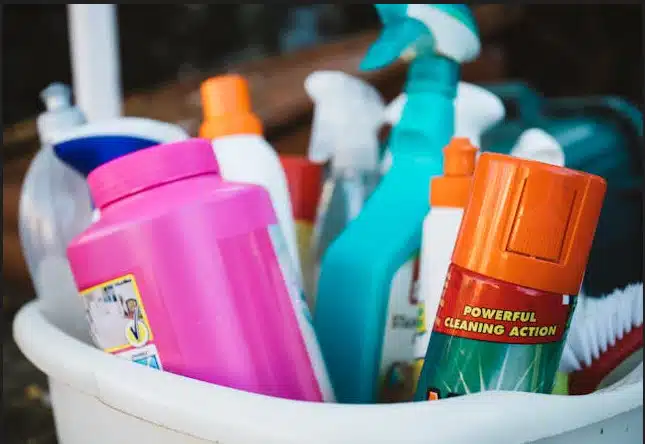Household Cleaning Products You Should Not Mix
Maintaining a clean and hygienic home is a cornerstone of long-term health, as spending time in a dirty living space can make residents more prone to respiratory illness, bacterial infections, and foodborne illness.
While it can be extremely satisfying to take a grungy kitchen, bathroom, or living space and make it spotless, care should be taken whenever multiple cleaning products come into play. There is quite a bit of chemistry going on in most modern cleaning products, and mixing the wrong chemicals can present a serious risk to your health. Read on to learn what items should never be mixed together. 
- Baking soda and vinegar – On their own, each of these items can be quite useful for household cleaning tasks. Baking soda has a very low ph level, while vinegar is extremely acidic. When mixed together, the two largely cancel out one another’s cleaning properties, however, they will bubble violently and release carbon dioxide.
This mixture is overall pretty benign, however, when mixed together in a closed container like a spray bottle, may cause the vessel to shatter under the pressure of the released gas and make quite a mess.
- Hydrogen peroxide and vinegar – Combining these household chemicals results in the creation of peracetic acid, an extremely caustic chemical commonly used as an industrial sanitizer.
Exposure to liquid peracetic acid can cause painful skin and eye irritation and damage, while inhaling the fumes of this chemical can cause extensive, sometimes fatal damage to the lungs.
- Multiple drain cleaners – Modern drain cleaning products are often composed of multiple chemicals in specific proportions to clear drains without creating unnecessary danger to the user. The hazard emerges when a drain remains clogged and a user immediately tries an alternate product, resulting in a chemical cocktail neither manufacturer anticipated.
When attempting to clean a tough drain, be sure to only use one product at a time and flush the drain repeatedly with water before trying a new brand.
- Bleach and pretty much anything else – Many people associate the smell of bleach with extremely clean environments like hospitals, however bleach rarely needs to be a part of your household cleaning routine. Bleach is used in hospital settings because it is an effective disinfectant, killing germs outright, but unless there is someone sick in your home, using bleach is overkill in most situations.
Another reason to be cautious with bleach when cleaning a household is that it can result in numerous hazardous chemicals when mixed with other cleaning products, ranging from chlorine gas (not ideal unless you are trying to recreate the Somme while cleaning your bathroom), to chloramine (causing shortness of breath) and chloroform, which can cause heart arrhythmias and depress the central nervous system.
Household chemicals that should not be mixed with bleach include:
- Vinegar
- Ammonia
- Rubbing alcohol
- Mildew stain removal products
- Toilet bowl cleaner products
- Lysol
- Oven cleaner
- Dish detergent
- Lemon juice
- Drain cleaner
- Glass cleaner
SelectCare’s team of dedicated home caregivers can assist with a wide variety of household tasks, including meal preparation, dressing, grocery shopping, travel, and – you guessed it – cleaning.
To learn how SelectCare helps, call SelectCare today, request a free in-home care guide, or read testimonials from our clients and their loved ones.
Contact us any time, 24/7 with any questions, or to request a free in-home evaluation.